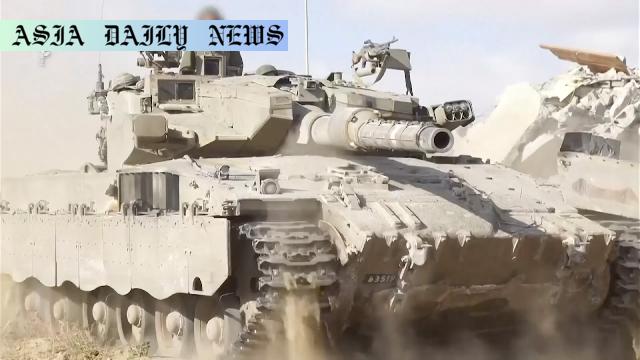Gaza Operations: Israeli forces set to intensify operations in Gaza with plans to evacuate civilians, secure zones, and provide aid.
Israeli forces plan to intensify operations in Gaza after President Trump’s Middle East visit.
Israeli government proposes relocation of civilians to safeguard them from conflict zones.
Humanitarian aid delivery to resume, but criticized by UN for lack of alignment with humanitarian principles.
Gaza health authorities record over 52,000 deaths attributed to ongoing conflict.

Renewed Operations in Gaza
The Israeli government, under the leadership of Prime Minister Benjamin Netanyahu, has announced a new phase of military operations in Gaza. Set to commence following U.S. President Donald Trump’s Middle East visit next week, the operation’s aim appears to be multifaceted: ensuring civilian safety within Gaza, increasing military presence, and taking measures to distinguish non-combatants from Hamas fighters. While the intent is reportedly to secure the region, significant criticism and concern persist regarding the timing and humanitarian impact of this decision.
According to reports, Israeli Defense Forces (IDF) will relocate civilians in northern Gaza to southern regions of the enclave. By doing so, Israel intends to demarcate civilian populations from the Hamas militants operating in the area. This strategy will likely involve extensive coordination and logistical challenges as thousands of individuals will require support. Officials have stated that these measures are part of a broader plan to “secure the area” and station troops to prevent further escalation in the northern zones. Such efforts seem critical to mitigating the conflict’s impact on urban populations, but their eventual success remains uncertain given the volatile environment.
The Humanitarian Angle
In addition to its military strategy, the Israeli government plans to normalize the delivery of humanitarian aid to Gaza. For the first time since March, the government intends to allow food and essential supplies into the region. However, a noteworthy condition stipulates that private security organizations and international groups will oversee distributions to ensure resources do not fall under Hamas control. This provision has sparked backlash from the United Nations. Olga Cherevko, representing the United Nations Office for the Coordination of Humanitarian Affairs, criticized the plan, calling it a deviation from internationally recognized humanitarian principles.
Such concerns highlight the broader complexities of delivering aid in conflict zones where governance structures and trust are fragile. On the one hand, this represents a positive step for restoring aid flows to vulnerable families; on the other, placing greater control of aid in the hands of a conflict party remains controversial. The operational efficacy of this approach will likely unfold in the coming weeks, and its potential to either build trust or further tensions will be crucial to observe.
The Scope of Devastation
The gravity of the ongoing conflict in Gaza cannot be understated. Health authorities in the enclave indicate that over 52,000 deaths have occurred due to the continued fighting. Hard-hit by extended periods of violence, the region’s infrastructure, healthcare facilities, and overall living conditions are left in dire states. Amid escalating violence, possible displacement of northern Gaza’s residents to southern areas introduces an additional layer of chaos, further stressing already-limited resources.
While military strategies and political decisions unfold, the catastrophic human cost weighs heavily. Continued fighting and a limited approach to humanitarian aid compound suffering in the region, underscoring the importance of sustained international diplomacy and aid to mitigate this crisis.
Outlook and International Repercussions
The announced “window of opportunity” for a potential hostage deal reflects a pivotal moment in the Israel-Gaza conflict. Israeli officials attribute strategic importance to the timing of President Trump’s visit, showcasing a confluence of regional and global actors in shaping the geopolitical landscape. This spotlight could intensify scrutiny over Israel’s decisions, with international organizations likely underscoring potential humanitarian violations.
From a global perspective, how the world reacts to these developments will influence future interventions and diplomatic strategies. Sustained discourse, transparency over operations, and measured steps could be ways to mitigate further escalation while addressing long-standing issues in the Gaza Strip. However, without concrete measures to preserve and protect civilian lives, both short-term peace efforts and long-term stability remain far out of reach.



Commentary
Examining the Decision to Intensify Operations
The decision by the Israeli government to renew military operations in Gaza underscores a deeply entrenched conflict that has persisted for decades. While officials argue that the relocation of civilians will enhance safety measures, this strategy introduces profound risks and logistical hurdles. The crowded conditions in Gaza’s southern regions may place an overwhelming strain on resources, stretching humanitarian support beyond its capacity. These plans, though seemingly pragmatic in intent, risk exacerbating tensions and further alienating affected communities.
Assessing the Controversial Aid Plan
The decision to resume humanitarian aid to desperate families is a positive step, but the conditions placed on this process appear problematic. Directly involving private organizations and granting more control to Israeli forces invites criticism about the potential politicization of aid. Moreover, as highlighted by the United Nations, this move breaks established humanitarian principles, which prioritize independence and neutrality in conflict zones. A thorough evaluation and potential recalibration of this aid strategy may be needed to ensure its alignment with global humanitarian norms while serving the vulnerable effectively.
Focusing on Civilian Lives and International Diplomacy
The staggering loss of over 52,000 lives represents an urgent call for action, not just for the warring parties but for the international community to intervene meaningfully. Mediation efforts, transparent mechanisms for aid distribution, and cessation of violence must work hand-in-hand to restore a semblance of stability in the region. Although geopolitical tensions complicate resolution prospects, global actors have a moral imperative to prioritize humanitarian relief and push for sustainable peace initiatives.
Ultimately, the unfolding developments in Gaza remind us of the fragility of peace in conflict zones. The balance between robust military strategies and safeguarding innocent lives is delicate but essential. Continued dialogue, accountability, and a strong emphasis on preserving human dignity must be central to any future approach to this protracted crisis.